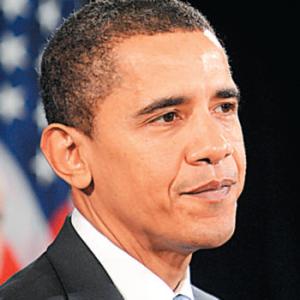Obama lauds China's growing role on world stage
 Tokyo - US President Barack Obama Saturday welcomed China's growing diplomatic and economic role on the world stage while reassuring traditional allies in the region that those ties remained strong.
Tokyo - US President Barack Obama Saturday welcomed China's growing diplomatic and economic role on the world stage while reassuring traditional allies in the region that those ties remained strong.
His remarks during his first visit to Asia since taking office in January outlined the Obama administration's Asian policy before a Japanese audience that included scientists and businesspeople at Suntory Hall in Tokyo.
Obama met Friday with Japanese Prime Minister Yukio Hatoyama, and is to meet Tuesday and Wednesday with Chinese President Hu Jintao in Beijing.
Obama said the United States was seeking "pragmatic cooperation" with the emerging giant of China, noting Beijing's "partnership" in jump-starting global economic recovery, its support for stability in Afghanistan and Pakistan and its commitment to the denuclearization of the Korean Peninsula.
"So the United States does not seek to contain China," Obama said. "On the contrary, the rise of a strong, prosperous China can be the source of strength for the community of nations."
Obama said that nations should not fear the success of each other.
"Cultivating spheres of cooperation - not competing spheres of influence - will lead to progress in the Asia-Pacific," Obama said.
At the same time, he insisted that Washington's "deeper relationships with China" does not mean a "weakening of our bilateral alliances."
Referring to his own boyhood experiences in Asia, when he lived in Indonesia, Obama said the Pacific Rim had "helped shape my view of the world."
Obama said it was equally important for Americans to understand their stake in the Asia-Pacific, "because what happens here has a direct affect on our lives at home."
"This is where we engage in much of our commerce and buy many of our goods," he said. "This is a place where the risk of a nuclear arms race threatens the security of the wider world, and where extremists who defile a great religion plan attacks on both our continents."
Obama declared Washington's intent to renew its active role in the Asian region after being disengaged in recent years, an apparent reference to his predecessor George W Bush's distrust of international organizations.
Drawing strong applause, Obama pointed out that he would be the first US president to meet with all 10 leaders from the Association of South-East Asian Nations (ASEAN) on Sunday in Singapore, where he will also participate in the annual summit of the Asia-Pacific Economic Cooperation (APEC) forum.
"As an Asia-Pacific nation, the United States expects to be involved in the discussions that shape the future of this region, and to participate fully in appropriate organizations as they are established and evolve," he said.
The US president called for North Korea to return to denuclearization talks, urging it to choose "international integration" over "isolation that has compounded the horrific repression of its own people."
The US, Japan, China, Russia and South Korea have been engaged in six-party talks with North Korea for years to convince Pyongyang to disband its nuclear weapons programme.
After Pyongyang tested another nuclear device earlier this year, the UN Security Council passed the most sweeping sanctions to date against the Stalinist state. But North Korea has been reluctant to return to the talks.
"We will not be cowed by threats, and we will continue to send a clear message through our actions, and not just our words: North Korea's refusal to meet its international obligations will lead only to less security - not more," Obama said.
He also called on Myanmar's military leaders to release opposition leader Aung San Suu Kyi, saying it was a precondition for any softening of sanctions against the country.
Myanmar needed to take "clear steps" toward democracy, including the unconditional release of all political prisoners, Obama said.
He noted that the US had begun communicating directly with the junta after neither sanctions nor engagement by others had succeeded. The message Washington was sending via the newly opened lines was "that existing sanctions will remain until there are concrete steps toward democratic reform." (dpa)